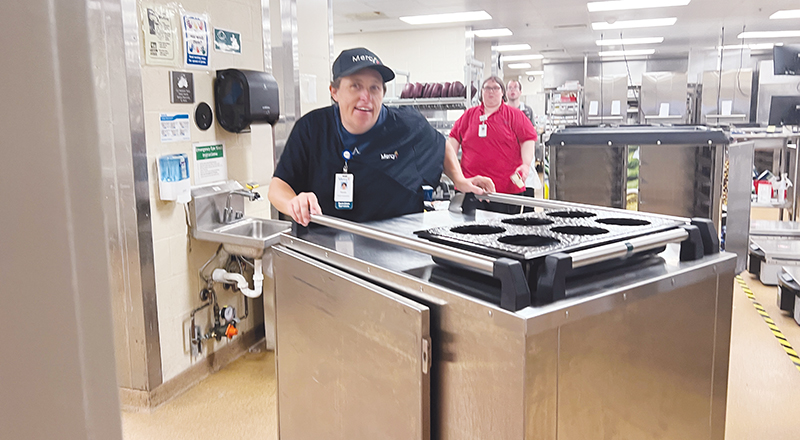
Farrah McKinley, 48, has worked at Mercy St. Louis for 18 years and got support from her employment specialist when she moved from the linen department to a more challenging job as a patient ambassador. She is one of about 100 supported co-workers
who work at Mercy St. Louis, Mercy South, and Mercy Jefferson. Valerie Schremp Hahn/@CHA
CREVE COEUR, Mo. — Mercy St. Louis has long been known and lauded for its work to employ and train employees with
intellectual and developmental disabilities throughout the hospital.
 Lenhart
Lenhart
"I like to tell people we have folks in MTS, which is our Mercy Technology Services, to EVS, that's our environmental services or housekeeping," said Paul Lenhart, Mercy's supervisor of disability workforce and inclusion across the St. Louis area.
A new way of supporting the employees has helped to dramatically grow the program. A few years ago, about 50 people with intellectual and developmental disabilities worked in competitive-wage jobs at the hospital. This year, that number doubled to about
100 people in about 17 departments in Mercy's Missouri hospitals. Most of these employees work at Mercy St. Louis, with others at Mercy South and Mercy Jefferson.
What changed?
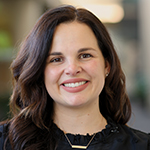 Hiatt
Hiatt
For years, people from outside support agencies would come in to check on these employees and act as a go-between with Mercy. But those liaisons didn't work on-site and were often "late to the game" if there was an issue, said Marisa Hiatt, the system's
director of diversity, inclusion, equity and belonging and experience.
Since 2021, Mercy has hired its own in-house employment specialists to work with the employees, called supported co-workers, and their supervisors. The employment specialists — four at Mercy St. Louis and one at Mercy Hospital South St. Louis —
put on many hats, explained Lenhart and Hiatt.
The specialists teach leaders and supervisors how to use different communication styles, how to train somebody who learns differently, how to support co-workers, and how to keep lines of communications open. They work with supported co-workers on tasks
like advocating for themselves, signing up for insurance and sometimes work with parents who still act as guardians.
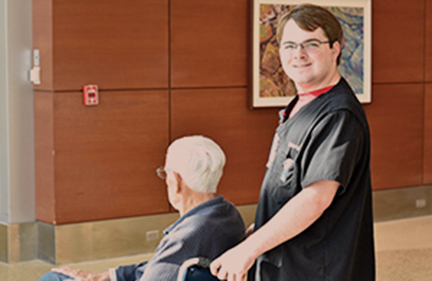 Alex Secrease is a patient transporter who has worked at Mercy St. Louis for eight years. Mercy uses employment specialists at three of its St. Louis-area hospitals to support co-workers who have intellectual and developmental disabilities.
Alex Secrease is a patient transporter who has worked at Mercy St. Louis for eight years. Mercy uses employment specialists at three of its St. Louis-area hospitals to support co-workers who have intellectual and developmental disabilities.
They're also there for support if an employee needs corrective action or a commendation.
"So it's not that our employment specialists will do things for our co-workers," explained Hiatt. "It's a lot of role-playing, saying, 'How are you going to ask your leader? Or how are you going to deal with a situation with a co-worker?' The hard skills
are the things we do daily, right? But a lot of the time, the soft skills, when someone has an intellectual or developmental disability, that's where things get harder. The employment specialists are really there to proactively support those individuals."
The employment specialists also assist with recruiting, helping people find the right job fit or advance to another job that's more of a challenge. Lenhart leads the employment specialists, works on recruitment and supports human resources.
Mercy is hosting job fairs at several Missouri hospital locations throughout October, which is National Disability Employment Awareness Month.
Finding funding
Mercy gets funding from the Eastern Region Alliance, which includes Jefferson County, St. Charles County, St. Louis City and St. Louis County tax boards. These tax boards pay the salaries of Lenhart and the employment
specialists. The boards administer funds collected from a special property tax.
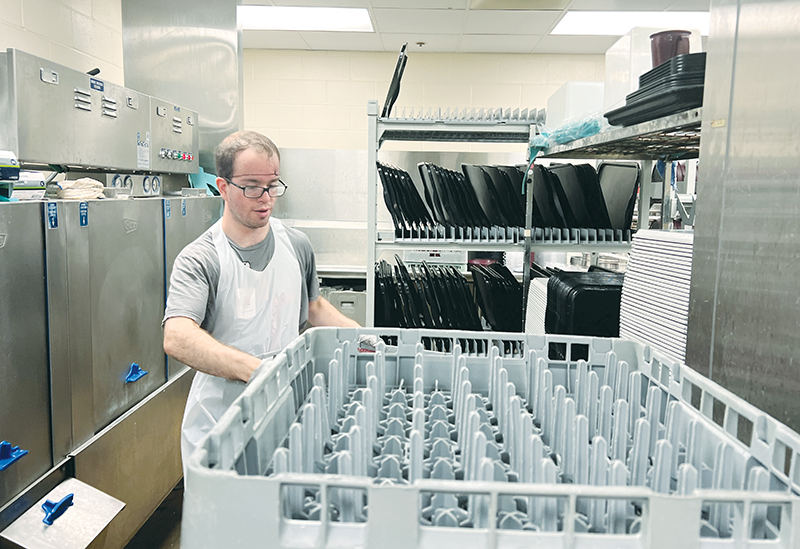
Food technician Jacob Wactor, 24, has worked at Mercy St. Louis for three years. Valerie Schremp Hahn/@CHA
The boards enter funding contracts with agencies that serve people with developmental disabilities. Of the more than $30 million the boards distributed for fiscal year 2025, $389,097 went to Mercy to fund Lenhart and his team of five employment specialists.
The health system is looking to expand the program elsewhere in Missouri, such as Springfield and Joplin, but needs to get more creative to find funding for their hospitals in Arkansas, Kansas and Oklahoma, said Hiatt. Mercy has shared its approach at
state, regional and national levels and is part of the National Organization on Disabilities Leadership Council.
Helping everyone
Lenhart said that some of the supports Mercy put in place help all employees, such as step-by-step guides with pictures to illustrate specific tasks, scripts for handling certain types of phone calls, and "badge
buddies" cards with important phone numbers that attach to the back of identification badges.
"It turns out that more and more times than not we have non-supported co-workers that are saying, 'Can I get that?'" said Lenhart. "At the end of the day, we're all co-workers. So we all support one another."
 Dains
Dains
Maggie Dains has been an employment specialist for Mercy for three years and for two years before that with an agency that contracted with Mercy. She works with supported co-workers on "anything and everything," including their job and personal concerns,
which often cross over. For example, one woman got injured on the job, so Dains is helping her set up appointments for workmen's compensation, understand the doctor's instructions and communicate with leadership.
Dains said supported co-workers are committed to their jobs, so much so that she often has to encourage them to take time off. "They're very dependable and reliable," she said. "This is their place of employment. It's also their place to socialize."
Dains has a learning disability herself and studied special education in college. She was supported by teachers and her family as a student and knew she wanted to help others.
"I want to give that support system, be part of that support system, for my co-workers," she said.
Lenhart also has a learning disability. He shares with co-workers how he adapts and gets support in his own work. "One of my superpowers as far as having a learning disability is that I am overly creative," he said. "I see things so differently than most
people. I can easily see the big picture and see the steps to get there before anyone else."
'Part of who we are'
Farrah McKinley, 48, has worked at Mercy St. Louis for 18 years and receives support from an employment specialist. She has spent most of her career in the linen department. Feeling burnt out and yearning for
a challenge, she moved to patient ambassador, a job Lenhart said was "significantly harder." A patient ambassador brings food, linens and other supplies to a patient.
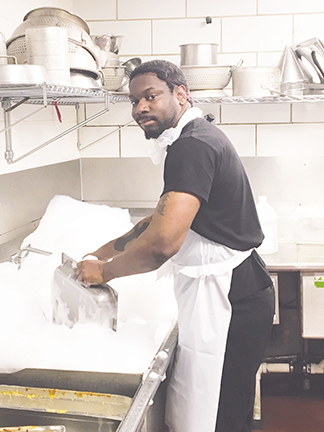 Mike Reid is a food technician at Mercy St. Louis who has worked there for more than 10 years. Mercy hospitals have long been known for employing people with developmental and intellectual disabilities and in recent years have hired employment specialists
to support those co-workers.
Mike Reid is a food technician at Mercy St. Louis who has worked there for more than 10 years. Mercy hospitals have long been known for employing people with developmental and intellectual disabilities and in recent years have hired employment specialists
to support those co-workers.
McKinley, who has a learning disability, got help through the transition from her employment specialist and Lenhart. "Farrah is amazing," said Lenhart. "She is so conscious on getting her trays delivered in a timely manner."
As she wheeled a cart with patient trays from room to room, McKinley explained: "We get here at 5, so we do the soiled linen and the trash. Then we get to stock the pantries in each of the areas, and stock the linen. Then we have to do this."
McKinley said that she has friends at the hospital and that she feels like her supervisors and co-workers understand her. "I like Mercy," she said.
Hiatt says being a hospital worker is a prestigious position. "You are a caregiver. You are helping our patients feel better, no matter what position you're doing," she said. "And so, I think there's a lot of pride in that."
Hiatt said the program ties well to the mission of Catherine McAuley, foundress of Mercy's founding congregation, the Sisters of Mercy. In a way, without knowing it, Hiatt said, McCauley was among the first to embrace diversity, equity, inclusion and
belonging.
"She just knew people needed help. And she didn't discriminate," Hiatt said. "For us, it's just so interwoven in what we do here that it's just natural. It's part of who we are."